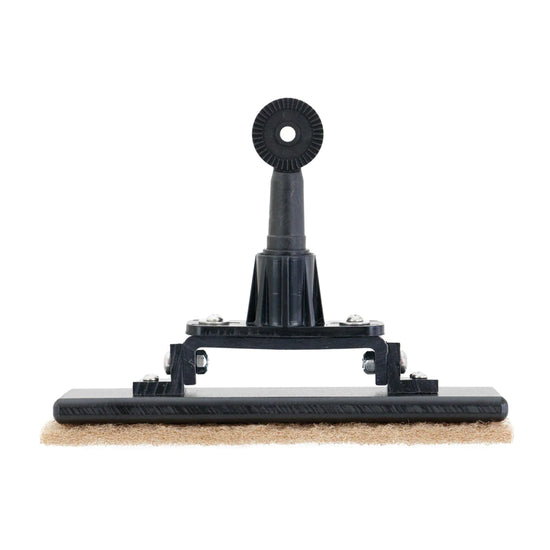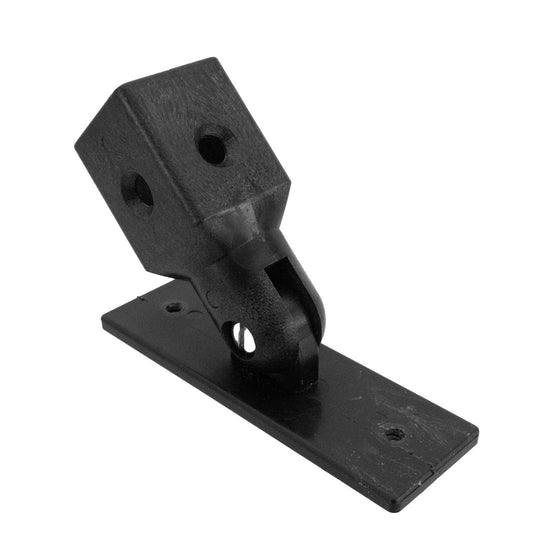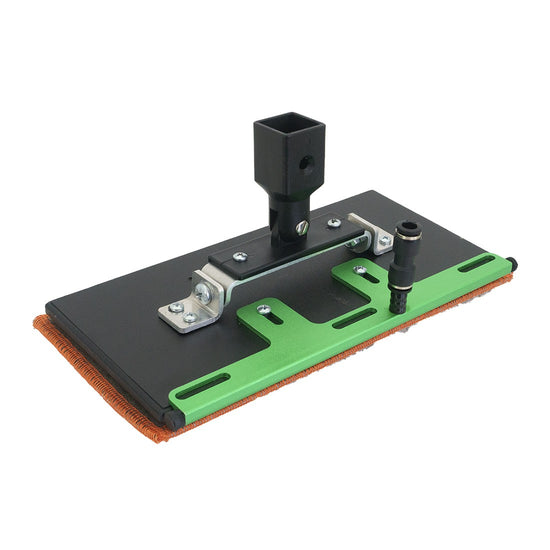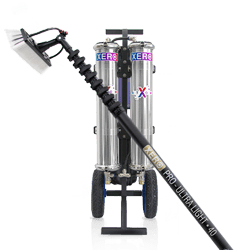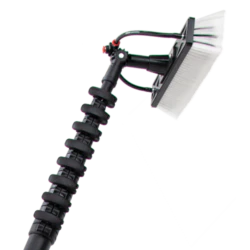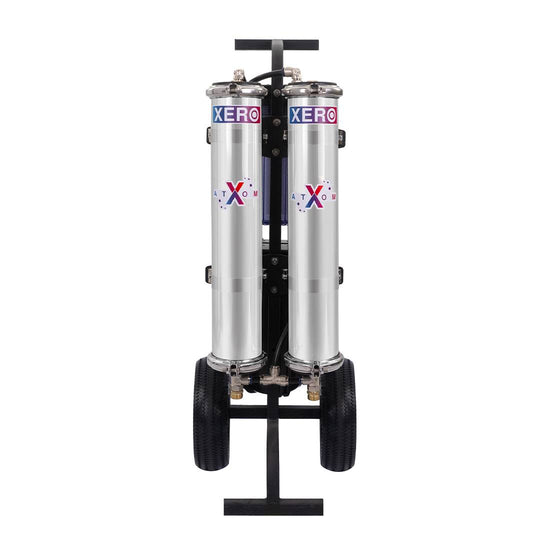Understanding Waterfed Brushes
Waterfed brushes attach to your waterfed pole, aiding in the efficient cleaning and scrubbing of your windows. This widely favored method of window cleaning is utilized by professionals worldwide and is renowned for its remarkable speed and effectiveness. Once the glass is wet, you can effortlessly remove dirt and grime using the brush's bristles, without needing soap. Meanwhile, a steady stream of purified water rinses away the residue, leaving windows sparkling and spotless.
With a wide variety of Water Fed Brushes currently available on the market, selecting the right brush can feel pretty overwhelming, especially when you're unsure which ones you need. Most avid Water Fed Pole users ultimately end up with a collection of different brushes that they use for various situations. Below, we explain the common brush types and highlight the distinctions among them so that you can find the perfect brush to suit your needs.

But which type of Brush is best?
There isn't one universal answer for which brush is best because it all depends on the window you're cleaning and what condition it's in. Here at Window Cleaning Resource, we offer many types of waterfed brushes, the most common being nylon, boar's hair, and hybrid.
If you were to ask instead, “Which type of brush is best for scrubbing stuck-on dirt and grime?” then a quality Boar’s Hair brush is your answer. If you're looking for a brush that's best for regular maintenance cleaning, then you'll want to go with a smooth-gliding Nylon brush. Or, if you want something that can be used for both super dirty windows and regular routine cleaning, a hybrid brush is the best choice for you.
Having an ample supply of waterfed brushes is essential, as certain brushes excel in different situations and with various types of glass. There's no such thing as having too many brushes in your collection of window cleaning supplies!
Our line of Pure Water Power Brushes is one of the most popular here at WCR. Offered in Boar’s Hair, Nylon, and Hybrid varieties, these quality brushes are available in 16-inch, 20-inch, and 23-inch sizes.
Or, check our other top collection of XERO waterfed brushes. These fan favorites are available in Boar’s Hair, Nylon, and Hybrid varieties, but also feature a unique Reverse Hybrid brush for solar panels. XERO brushes come in 12-inch and 18-inch sizes.
The Three Popular Brush Bristles
Full Nylon is great for maintenance cleans, Boar's Hair is the most aggressive, and Hybrid gives you the best of both worlds.

Boar's Hair Bristles
Boar's Hair bristles are all natural real Boar's Hair. They have the most aggressive scrubbing power so they are perfect for filthy, first time cleans or irregular cleans. It can clean with fewer passes, but it is heavier than Nylon so it is not recommended for above 3 stories. These brushes absorb a ton of dirt so you must rinse with the brush off the glass.
Nylon Bristles
Nylon (also called Monofilament) bristles are made of a soft, plastic material. Nylon brushes are typically gentle, lighter and not as aggressive as Boar's Hair. Nylon brushes are best for regular maintenance cleans that don't require much scrubbing. Nylon does tend to last longer than Boar's Hair and are usually less expensive than Boar's Hair brushes. Also, you can rinse with the brush on the glass so they are great for any height!
Hybrid Bristles
As the name suggests, Hybrid brushes contain bristles that are a mix of Nylon and Boar's Hair so it's the best of both worlds! It is currently the most popular type of brush we sell. With these brushes, typically the nylon fibers are on the outside and the shorter boar's hair bristles are in middle. This allows for a great glide on the glass while having the power to agitate up stubborn dirt.
-
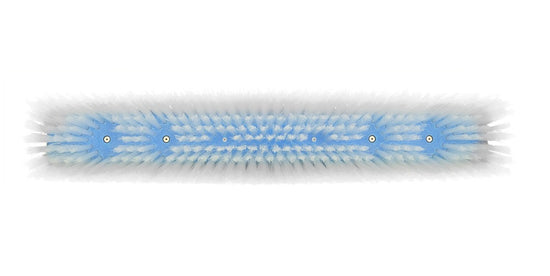
NYLON
Characteristics- Bristles are soft plastic material
- Gentle; Not as aggressive as Boar's Hair
- Lighter than Boar's Hair
- Sometimes called Monofilament
- You can rinse with brush on glass
Best For- Working at any height
- Regular maintenance cleans
Cost- $
-
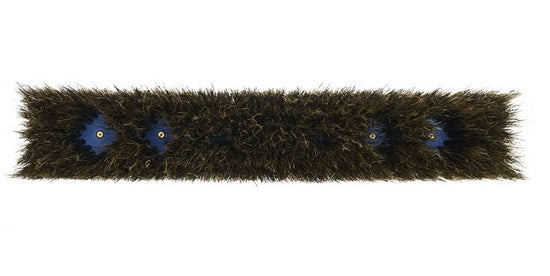
BOAR'S HAIR
Characteristics- Bristles are all natural real Boar's Hair
- More aggressive scrubbing power
- Can clean with fewer passes
- Heavier than Nylon
- You must rinse with the brush off the glass
Best For- Less than 30′ or 3 stories
- First time or irregular cleans
Cost- $$$
-
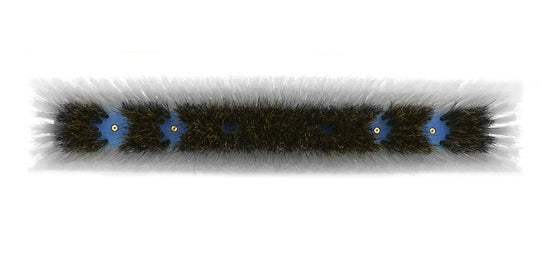
HYBRID
Characteristics- Bristles are a mix of Nylon & Boar's Hair
- Moderately Aggressive
- Great Glide on Glass
- All-Purpose Option
- Currently the most popular
Best For- Most Situations
- Commercial or Residential
Cost- $$
Jets: Pencil vs. Fan
What is the difference? What is best for you? Keep reading to learn more about pencil and fan jets!
-

-
BRUSH JETS
Every brush comes with a set of jets that allow water to spray onto your glass surface, Brushes come equipped with either single jets or dual jets. Smaller brushes, those that are 12 inches, typically come with single jets, while larger brushes, 18 inches, usually come with dual jets.
PENCIL JETS
Pencil jets emit a small, circular jet of water that provides a heavier rinse. It's easier to be more precise with pencil jets.
FAN JETS
Fan jets emit a fine "fanned" mist of water over a larger area. If the glass doesn’t require tons of cleaning, fan jets are usually preferable because they allow you rinse quicker. Fan jets allow for a final rinsing of the window while still in contact with the surface.
Two Important Terms
Understand and know the difference between Hydrophilic Glass and Hydrophobic Glass!

Hydrophilic VS Hydrophobic
To put it in the simplest of terms, something defined as hydrophilic is actually attracted to water, while something that is hydrophobic resists water.
Hydrophilic Glass
Hydrophilic Glass directly translates to “Water loving.” Hydrophilic surfaces become wet very easily and can maintain that wetness longer. Water will sheet on the glass when it gets wet which makes it easier to clean. This type of glass is preferred by window cleaners as it will come clean easily. While it's easiest to clean, it may also be more prone to hard water staining and pollutants if not maintained. Pencil jets are great to use on Hydrophilic Glass.
Hydrophobic Glass
Hydrophobic Glass translates to “Fear of water” or “water hating.” Water will bead and run off hydrophobic surfaces very quickly. It is suggested to use fan jets on hydrophobic glass for more reliable rinse coverage. This type of glass is harder to work on and spotting is more likely. This can make cleaning with a water fed pole more challenging, but certainly not impossible. Be sure to go slow and scrub well.
Size: Block vs splay
Understand the difference between the terms "Block Size" and "Bristle Splay"!
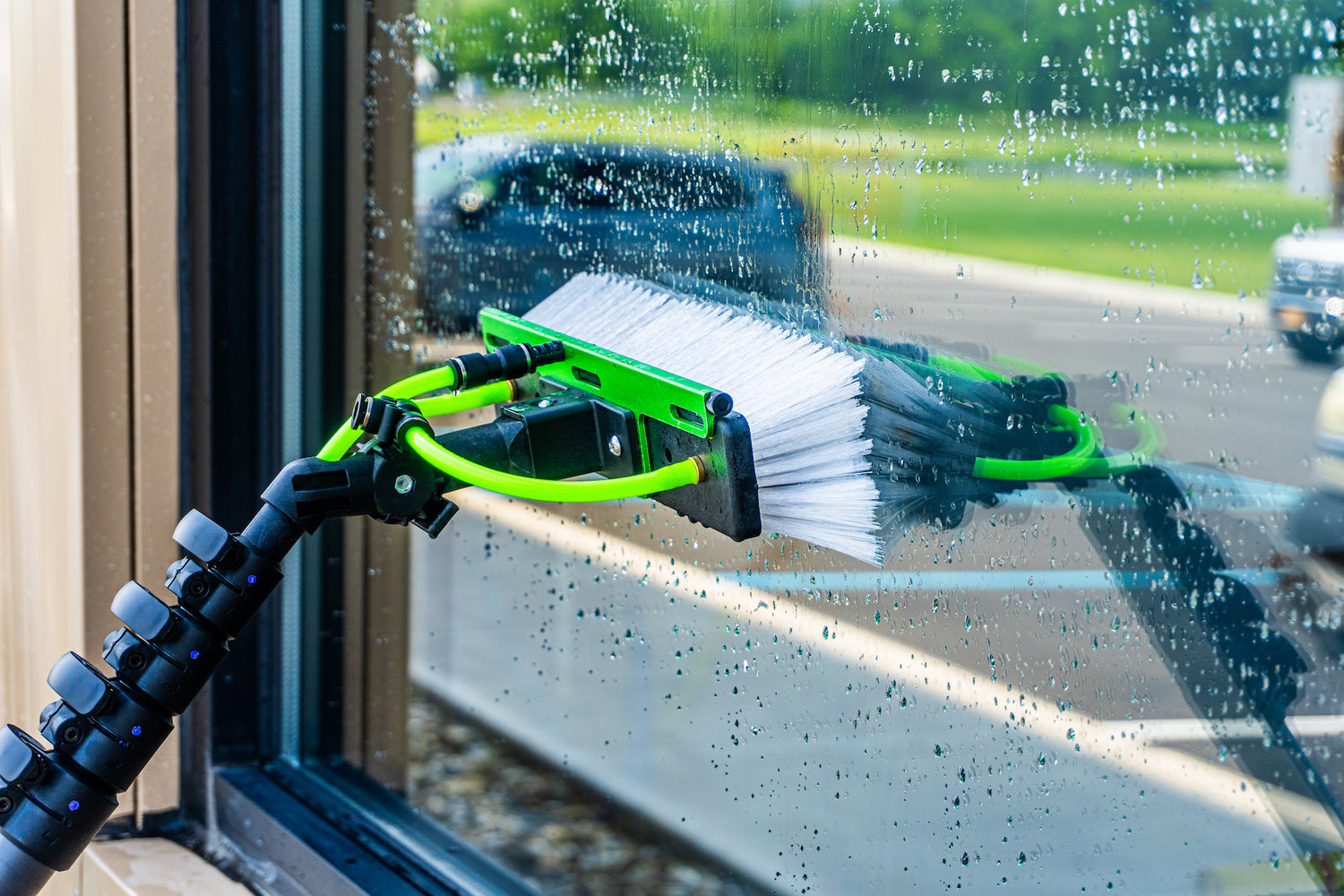
Water-fed brushes are available in a range of sizes. The term "splay" refers to how far the bristles extend when pressed down; typically around 2 inches longer than the block that holds all the bristles. For instance, a 10-inch block can effectively clean up to 12 inches of surface area due to its bristle splay, and would therefore be labeled a 12-inch brush. The choice of brush size hinges on the specific job site, be it solar panel cleaning, residential window cleaning, or commercial window cleaning.
Here is a little guide to help you gauge what size brush you might want to consider:
- 12-inch brushes are ideal for residential jobs with small to medium-sized windows
- 16-inch brushes are ideal for commercial jobs with medium to large-sized windows
- 18-inch brushes are ideal for commercial jobs with large to extra large windows
- 20 to 23-inch brushes are great for solar panel cleaning.
Caring For Your
Water Fed Pole Brushes
Extend the performance and life of your brush by giving it proper care.

Keep It Clean
Always try to keep your brushes in good condition. Be sure that your brushes are kept clean whenever possible. Leave them soaking in pure water overnight or between jobs if necessary. Keeping it clean will extend the life of your brush.
When Not In Use
When your brush is not in use try not to leave brushes propped up against brick walls or other surfaces, because it will pick up dust and transfer it to the glass. If you must leave it against a wall or put it down on a surface, make sure the head is turned away from the brickwork or surface.
Proper Storage
Think about storing your spare brushes in a toolbox, bucket, or other container when not in use. Be sure that they are laying flat with nothing pressing against the bristles, so they do not get damaged or deformed.
Waterfed Brush Accessories
These accessories will help you work smarter, not harder!






